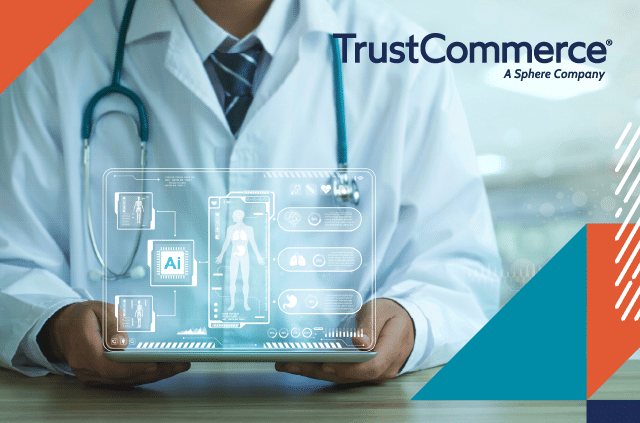Artificial Intelligence, or AI, has been working in the background in most American’s lives for a while now, but has lately been receiving new buzz. This new attention is largely due to the popularity of generative AI such as ChatGPT. According to MLQ.ai, generative AI uses deep learning algorithms to learn patterns and features to generate new data that resembles real world input. It can be used to create text, images, code, or any other type of data, even audio, video, and more. This means that tasks that are currently handled by humans could be taken over by generative AI. McKinsey estimates that generative AI could add trillions in value to the global economy and automate roughly 50% of work activities performed today, leading to an enormous boost in productivity.
Three use cases for AI in healthcare
1. Using AI in healthcare can ease staff burden
The recent innovations in artificial intelligence could be the answer to the troubling levels of burnout – estimated to affect nearly half of all healthcare industry workers according to a recent study published in the Journal of General Internal Medicine. In addition to automating tasks that would have previously required staffing resources, using AI in healthcare can also make sure that existing staff are being used more effectively and that workloads are distributed equitably. For example, Healthcare IT news recently highlighted a predictive AI algorithm developed by OSF Healthcare to optimize staffing and patient allocation for cancer patient navigators who provide education, advocacy, and support to specific cancer patients on their care journeys. Tools like the one being developed by OSF are being used to improve efficiencies and to lighten the load for overburdened healthcare professionals.
2. Using healthcare AI to assist with diagnosis and treatment
Due to the scattered nature of healthcare data, physicians may not have patients’ complete information. By using artificial intelligence in healthcare, AI can gather data from multiple sources (personal and family medical history, lifestyle and habits, even data from smart devices) to better identify potential issues and recommend next steps for treatment. With AI assisting in earlier diagnoses, patient outcomes have the potential to be improved.
3. Using healthcare AI to enhance patient engagement
Primary care practices have been incorporating digital tools such as mobile apps and online portals to enhance patient engagement and alleviate some staffing challenges. Now some practices are taking it a step further by using AI to deploy virtual assistants to help with answering patients’ simple questions. In fact, a recent study found that 78% of patients preferred the AI virtual assistant’s answer over the actual physicians stating that the answers seemed to be more empathetic and in depth. The quick response time and ability to get answers 24/7 is highly beneficial to patients and enhances their overall experience.
Understanding patient sentiment
According to the Pew Research Center, nearly 45% of Americans are equally concerned and excited regarding increased use of AI in daily life, with 37% reporting greater concern and 18% reporting greater excitement. When asked to explain feelings of excitement, most respondents said they looked forward to the improvements AI could bring to daily life and society as a whole. Those who expressed feelings of concern were most worried about loss of human jobs and digital privacy.
A recent survey by GE Healthcare revealed that those in the healthcare space (including providers, patients, and patient advocates in eight countries) are still highly skeptical about the benefits of AI in healthcare. A 2023 study by the British Medical Journal showed that the greatest risks include potential for patient harm due to AI and issues with data privacy and security. According to GE Healthcare’s chief technology officer, Dr. Taha Kass-Hout, the apprehension towards expanded use of AI in healthcare is understandable, but at the same time, healthcare AI is being used very successfully right now and could be better utilized to lessen human error and improve patient outcomes. The way forward, says Kass-Hout, is to “bring clinicians into the fold” when it comes to AI development so that the technology is more intuitive and facilitates healthcare work rather than impeding it.
Assessing and mitigating risks of artificial intelligence in healthcare
TrustCommerce’s Chief Compliance Officer, Heather Randall, PhD, said in a recent webinar about artificial intelligence titled, “AI in Healthcare Panel Discussion: The Framework for Responsible Adoption and Implementation,” that “AI is like a hammer, and like all tools, when applied correctly they can be great. However, it’s important that organizations conduct thorough research and plan out an implementation strategy.”
When assessing and mitigating AI risks in healthcare, major areas for consideration include the following:
Responsible AI governance:
According to UNC Health’s chief analytics officer, Rachini Ahmadi-Moosavi, proper AI governance in healthcare “holds the technology accountable by ensuring bias is not introduced in risk models and generative AI solutions… ensuring fairness and consistency.” In the clinical arena, “AI must avoid pitfalls related to clinical bias and ensure ethics are at the cornerstone of care delivery.” UNC Health is working with outside partners such as Microsoft to develop an AI & Automation Advisory workgroup so that clinicians and healthcare system leaders can continuously work to develop and safeguard new AI for use in the healthcare space.
Education and training:
As most organizations know, employees may be hesitant to embrace the implementation of new technology. Healthcare workers are no different. In order to overcome the fear of change and lack of understanding, organizations should create an implementation strategy and invest in comprehensive training programs which allow staff to get familiar and learn the responsible use of healthcare artificial intelligence within applications. It is also important to form interdisciplinary teams to collaborate on what types of applications are most helpful and to act as “AI ambassadors” to others in the organization. Above all else, transparency and open communication with employees is key to making any new initiative a success.
Privacy and security:
With cyberattacks on the rise each year, organizations must implement strong security measures to protect against healthcare data breaches. It is particularly important that any new AI applications used in healthcare have airtight security to ensure the privacy of sensitive information. While the success of AI in healthcare is dependent upon patient data to improve algorithms, all personally identifiable information (PHI) must be protected under law and will continue to be protected even as AI uses general information to train its systems. One potential way to safeguard patient information is to de-identify data before it is entered in any AI-run system. However, the de-identification process is uniquely challenging because as AI gets smarter, it can make connections itself that will reveal the identity of patients. Experts are working on sophisticated encryption methods to better protect sensitive information.
Weighing the benefits of AI in healthcare
In short, AI has huge potential to benefit the healthcare industry. From easing staff burdens to assisting with diagnosis and treatment, AI can help improve the overall patient experience. However, it is important to assess and mitigate the risks, including safeguarding patient information and effectively educating employees to ensure the technology is being used effectively. With the proper strategy, AI can be a valuable tool in healthcare, helping improve both the patient and staff experience.
For further discussion on the benefits of AI in healthcare, download the TrustCommerce webinar recording “AI in Healthcare Panel Discussion: The Framework for Responsible Adoption and Implementation,” and discover how healthcare systems can responsibly adopt and integrate AI technology.






